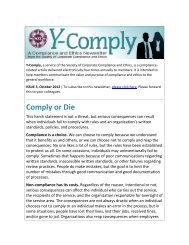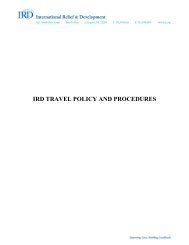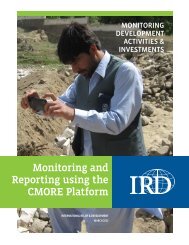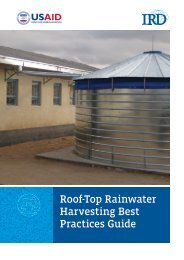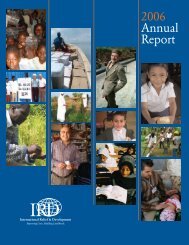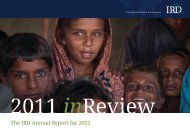Empowering citizens Engaging governments Rebuilding communities
Empowering citizens Engaging governments Rebuilding communities
Empowering citizens Engaging governments Rebuilding communities
You also want an ePaper? Increase the reach of your titles
YUMPU automatically turns print PDFs into web optimized ePapers that Google loves.
IRD transported all its CSP records<br />
into a three-story facility that it leased<br />
for the express purpose of allowing<br />
any auditor from any organization easy<br />
access to review the program files<br />
Box 7<br />
Enhancing internal controls and program oversight<br />
3<br />
Managing CSP in an active conflict zone required IRD to continuously improve internal controls and create layers of<br />
accountability and transparency. IRD acted quickly to address potential abuses at the local level and administrative<br />
weaknesses at the international level. In fact, the organization enhanced enough of its financial and programmatic<br />
policies before March 2008 that six of the recommendations had already been addressed before the final audit<br />
was released. “We take any allegations of fraud and abuse extremely seriously and even more so when they involve<br />
concerns about the use of US taxpayer dollars,” IRD President Dr. Arthur B. Keys said at the time.<br />
In addition to the suspension of the program in one of the Baghdad districts, the major recommendations from the<br />
inspector general’s office included a comprehensive review of projects in other areas, enhancing coordination with<br />
program participants, establishing more detailed procedures for reporting potential system abuses, improving data<br />
quality management, and strengthening the program’s monitoring and evaluation processes. By September 30,<br />
2008, all recommendations had been fully implemented and certified by USAID and the Secretary of State. Speaking<br />
at a November 2009 symposium on CSP, Keys spoke about IRD’s commitment to stabilization. “We’ve been in Iraq,<br />
in the Red Zone, since June 2003, when the Iraq Community Action Program started,” he said. “The reason CSP<br />
was undertaken, and why it was such a big program, is because it was a big job that had to be done. And all these<br />
projects were done with a very professional approach. But [USAID] didn’t change the standards; they didn’t change<br />
the regulations for CSP versus any other program in the world.”<br />
Successes and setbacks<br />
As stabilization operations in Iraq and Afghanistan became more politicized, CSP became an even larger target. So<br />
IRD took the unprecedented step of opening a data warehousing and auditing facility in Amman, Jordan. The organization<br />
transported all its CSP records into a three-story facility that it leased for the express purpose of allowing any<br />
auditor from any organization easy access to review the program files, documentation, datasets, and contracts in a<br />
secure facility across the Iraqi border. After the program came to an official end, IRD moved all its final documentation<br />
to the warehouse.<br />
Despite the strongest possible oversight efforts and close coordination among IRD, USAID, and military counterparts,<br />
preventing misuse of funds or small-scale corruption at the program level in a country like Iraq remained a<br />
laborious task. As CSP progressed, additional allegations of misconduct arose in Mosul. IRD responded swiftly,<br />
launching its own internal investigation with the help of outside counsel and sending to the site an experienced<br />
investigative team comprising both senior IRD and external experts. IRD staff were interviewed by the US government,<br />
and the allegations were not substantiated.<br />
A unique purpose in support of COIN objectives<br />
The business development program’s overall aim<br />
was to provide long-term jobs to those in CSP’s focus<br />
population, to provide business training to grantees,<br />
and, ideally, to transition vocational training and<br />
apprenticeship graduates into regular employment.<br />
The grants, awarded as equipment and services<br />
rather than cash, ranged from micro to small to<br />
medium, starting as low as $150 and capping at<br />
$100,000. Of the more than 10,000 grants awarded,<br />
97 percent were micro or small, most to family-owned<br />
41


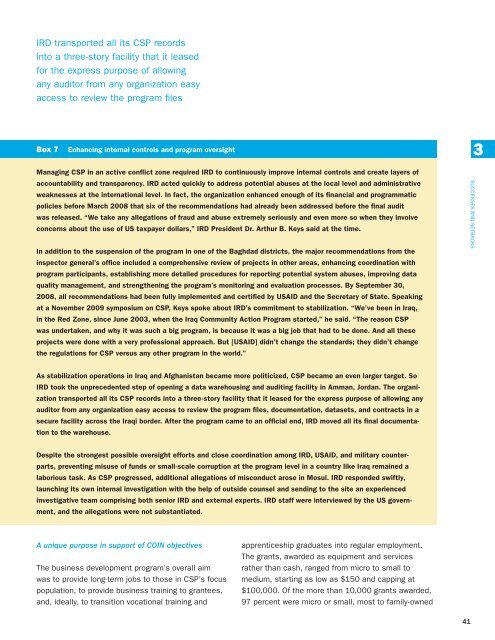
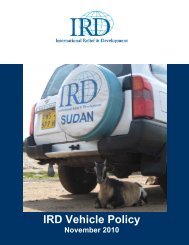
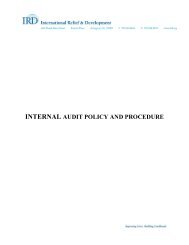
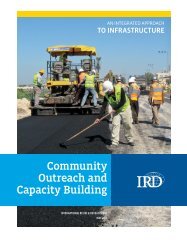
![Guide bonne pratique production d'oignon qualité_VF_4_2411012[1]](https://img.yumpu.com/23506639/1/184x260/guide-bonne-pratique-production-doignon-qualitac-vf-4-24110121.jpg?quality=85)

